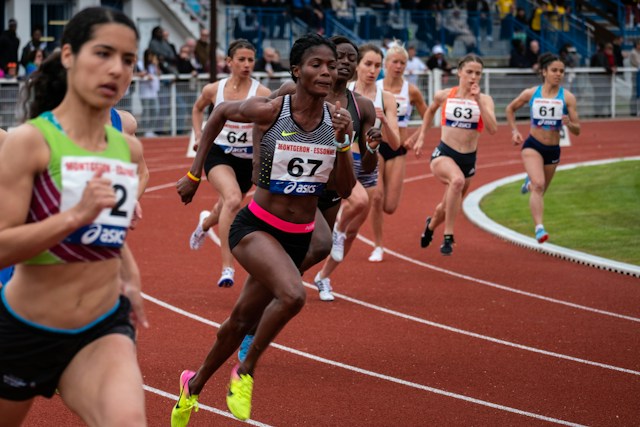The dynamic world of sports is deeply rooted in communication. It’s a lifeline that connects athletes, coaches, the support team, and all other stakeholders in the sporting ecosystem. As you, the stakeholders in this vibrant world, can attest, communication plays a critical role in driving a team’s performance. But how can you ensure effective communication in this setting? Let’s explore this together.
The Importance of Communication in Sports
Before delving into effective communication strategies, let’s first understand why communication is critical in sports. In any team sport, be it football, basketball, or cricket, players need to communicate – both verbally and non-verbally – to coordinate their actions, plan their strategies, and motivate each other. Coaches, too, need to convey their instructions, feedback, and support to the players clearly and promptly.
Lire également : What are the key factors in designing effective anti-doping workshops for young athletes?
A study published on Google Scholar by Jowett and colleagues (2013) highlights the importance of the coach-athlete relationship in sports. The study underscores that communication is the bedrock of this relationship, influencing athlete satisfaction, commitment, and performance.
Building Effective Communication: The Coach’s Role
Coaches are the architects of a team’s communication system. So, how can a coach build an effective communication framework? Let’s explore some strategies.
Dans le meme genre : How to implement effective ijury surveillance systems in contact sports?
To start with, coaches need to establish an open and trusting relationship with their athletes. This involves being approachable and receptive to feedback, which helps foster a safe environment where athletes can express their concerns and ideas.
Moreover, coaches should communicate their expectations clearly and consistently. This helps athletes understand their roles and responsibilities, reducing confusion and potential conflict.
Lastly, coaches should use positive reinforcement to motivate their athletes. Positive feedback not only boosts an athlete’s confidence but also strengthens the coach-athlete relationship.
Nurturing Communication: The Athlete’s Role
While coaches are instrumental in establishing effective communication, athletes, too, play a significant role in nurturing it. As an athlete, you should actively participate in communication by voicing your thoughts, ideas, and concerns.
Active listening is another crucial skill for athletes. By listening attentively to the coach’s instructions and feedback, athletes can accurately understand and implement the strategies discussed.
Moreover, athletes can use non-verbal communication to their advantage. Body language, gestures, and facial expressions can provide additional cues about a player’s state of mind and intentions, facilitating communication on and off the field.
Leveraging Technology to Enhance Communication
As times change, so must the tools we use to communicate. Today, technology plays a critical role in enhancing communication in sports. There are numerous communication platforms available, such as video conferencing tools, messaging apps, and social media platforms, that can help bridge the communication gap between athletes and support staff.
For instance, video conferencing can be used for team meetings, training sessions, and strategy discussions, allowing teams to connect virtually when face-to-face interaction isn’t possible. Similarly, messaging apps can facilitate quick and easy communication, especially for sharing updates, schedules, and feedback.
Cultivating a Culture of Communication
Creating a culture of communication within a sports team is essential to promote open dialogue and foster mutual respect. This involves encouraging all team members – athletes, coaches, and support staff – to communicate openly and honestly, fostering a sense of transparency and trust within the team.
Moreover, providing regular opportunities for team communication, such as team meetings and debriefing sessions, can enhance communication. During these sessions, everyone should be encouraged to share their thoughts and ideas, fostering a sense of camaraderie and mutual respect.
Lastly, addressing communication issues promptly and constructively can prevent misunderstandings and conflicts from escalating. This involves being proactive in identifying potential communication issues and addressing them through mediation or conflict resolution strategies.
In conclusion, effective communication is a vital component of success in sports. Hence, both athletes and support staff must work collaboratively to develop and maintain robust communication strategies. By doing so, they can create a conducive environment for growth, performance, and success.
The Role of Support Staff in Strengthening Communication
The support staff, often an unsung hero in the sports ecosystem, plays a crucial role in bolstering effective communication. Comprising the team’s medical staff, nutritionists, psychologists, and more, the support staff provides a strong foundation for the team’s success.
First and foremost, support staff must cultivate robust communication skills to understand and address the diverse needs of athletes. After all, clear and concise communication is key to ensuring athletes receive the support they need to perform at their best.
Support staff should also be open to feedback. Similar to the coach-athlete relationship, an open dialogue between support staff and athletes can help identify areas for improvement. Platforms like Google Scholar and Crossref Google can provide valuable insights into the latest research on athlete support and communication strategies.
Furthermore, the support staff should foster a positive and supportive environment to encourage athletes to share their concerns without hesitation. This includes showing empathy towards athletes’ struggles and celebrating their successes, no matter how small they may seem.
Lastly, maintaining confidentiality is a critical aspect of the support staff’s role. Athletes must feel confident that their personal information and concerns shared with the support staff will be kept private. This not only safeguards the athlete’s privacy but also reinforces trust within the team.
Drawing the Communication Blueprint: A Collaborative Effort
Effective communication within a sports team is not the responsibility of a single individual. Instead, it is a collaborative effort that involves athletes, coaches, and support staff.
For instance, coaches are responsible for setting clear expectations and providing constructive feedback. Athletes, on the other hand, should actively participate in communication by expressing their thoughts and concerns. Additionally, they should practice active listening to understand the coach’s instructions thoroughly.
The support staff, too, has a significant role to play. By honing their communication skills and fostering a supportive environment, they can bridge the communication gap between athletes and the rest of the team.
Moreover, leveraging technology can significantly enhance team communication. From video conferencing tools to messaging apps, technology can provide a platform for real-time, effective communication, regardless of location.
Conclusion
Developing effective communication strategies between athletes, coaches, and support staff is essential to bolster the team’s performance and success. Each member of the team, whether a coach, an athlete, or a support staff member, plays a crucial role in this process.
By fostering an environment of open dialogue, active listening, and mutual respect, teams can overcome communication barriers and function as a cohesive unit. Leveraging technology can further enhance these communication strategies, ensuring everyone stays connected and informed.
Remember, success in sports is not just about physical strength and skill, but also about effective communication and strong relationships. As the saying goes, "Talent wins games, but teamwork and intelligence win championships." So, strengthen your team’s communication today to pave the way for a brighter, more successful future.











